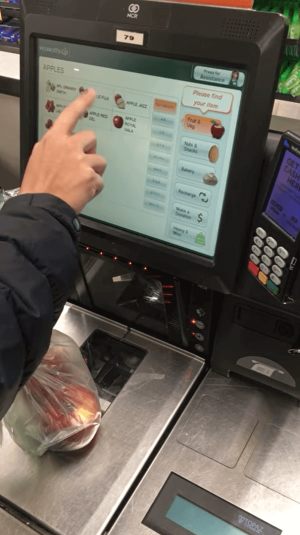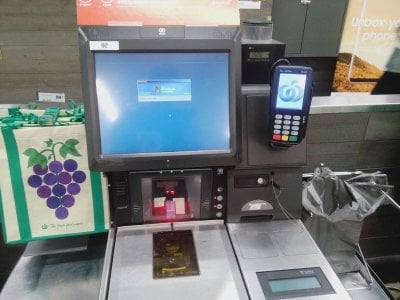Woolworths Faces Criticism Over 'Invasive' Store Surveillance as AI Self-Checkout Trial Widens
- Replies 15
Grocery giant Woolworths has recently announced that it expanded the trial of its self-checkouts that use artificial intelligence (AI) to 110 stores in Queensland, New South Wales, and Victoria.
‘It helps reduce mis-scans and is one of a number of initiatives we've rolled out across our checkouts to make shopping more convenient and seamless,’ a spokesperson told 9News.
‘While most customers do the right thing at our self-serve checkouts, we're all busy and mistakes can easily happen.’
When customers scan items at the self-checkout area, cameras installed overhead will record what's been put into the basket and whether it's been correctly scanned.
The AI then replays the footage to alert the shopper if it spots an incorrect scan, offering a chance to rescan it in order to prevent any accidental wrong scans.
On paper, the process sounds appealing and in keeping with the marvels of advances in technology.
In reality, the measure has been met with intense scrutiny. Shoppers have previously claimed that the AI often marks their scans as inaccurate, leading to longer checkout times as they wait for in-store staff to come over and investigate their situation.

Samantha Floreani, Program Lead for Digital Rights Watch, said that using such technology could leave some customers feeling ‘like they are being watched and recorded’.
'This kind of normalisation of surveillance makes space for the growing use of invasive technologies in everyday life to access essential everyday services,' she said.
'These technologies are framed as an improvement for customers, but in reality, it is a punitive use of automation technology to cut costs on staffing for large corporations while treating every customer as a suspect'.
As evidenced by Woolworths’ expansion, self-checkouts seem to be a feature most retailers are keen on adopting.
But are Australia’s laws keeping up with the fast pace of change? Some advocates say not quite.
‘Currently, businesses are making up the rules as they go along, and customers are left navigating the confusion and assessing the risks for themselves,’ said CHOICE Consumer Data Advocate Kate Bower.
‘The Privacy Act Review is an opportunity to reset the balance in favour of consumers by introducing a duty of care for businesses to use customer data fairly and safely.’
CHOICE wants an inquiry into AI’s impacts on privacy and consumers.
Early last year, retailers Kmart, Bunnings, and the Good Guys paused trials of their facial recognition technology in stores after its consistency with Australian privacy laws was questioned by the group.

According to reports, the technology was similarly meant to protect customers and staff, as well as reduce theft.
In this regard, Woolworths edges out other retailers, according to Bower.
‘The Woolworths cameras don’t collect sensitive biometric data or personal information,’ Bower said.
‘Woolworths has also taken steps to keep customers informed using a combination of in-store signage and public statements.’
‘Importantly, customers can opt out by using the traditional checkout process. These are all consumer protections Bunnings and Kmart failed to implement.’

Responding to these criticisms, a Woolworths spokesperson said that whilst the self-checkout footage is saved for training purposes, customers can rest assured knowing that their faces are blurred and pin pads are blacked out.
Guardian Australia notes, however, that Woolworths did not answer how and how long they stored data captured in their systems.
Woolworths has also implemented signages to alert customers of the AI self-checkouts in some outlets.
Hopefully, retailers like Woolworths will balance privacy and convenience as they try their new AI self-checkouts in more places.
So, what are your thoughts on this? Do you share these concerns that Aussies are always left the ones adjusting to retailers’ new technologies?
What improvements could be made in regard to self-checkouts?
Tell us your thoughts below!
‘It helps reduce mis-scans and is one of a number of initiatives we've rolled out across our checkouts to make shopping more convenient and seamless,’ a spokesperson told 9News.
‘While most customers do the right thing at our self-serve checkouts, we're all busy and mistakes can easily happen.’
When customers scan items at the self-checkout area, cameras installed overhead will record what's been put into the basket and whether it's been correctly scanned.
The AI then replays the footage to alert the shopper if it spots an incorrect scan, offering a chance to rescan it in order to prevent any accidental wrong scans.
On paper, the process sounds appealing and in keeping with the marvels of advances in technology.
In reality, the measure has been met with intense scrutiny. Shoppers have previously claimed that the AI often marks their scans as inaccurate, leading to longer checkout times as they wait for in-store staff to come over and investigate their situation.

Woolworths’ self-checkouts have been criticised for checkout errors which place shoppers inat awkward positions. Image Credit: YouTube/dongtranhynh
Samantha Floreani, Program Lead for Digital Rights Watch, said that using such technology could leave some customers feeling ‘like they are being watched and recorded’.
'This kind of normalisation of surveillance makes space for the growing use of invasive technologies in everyday life to access essential everyday services,' she said.
'These technologies are framed as an improvement for customers, but in reality, it is a punitive use of automation technology to cut costs on staffing for large corporations while treating every customer as a suspect'.
As evidenced by Woolworths’ expansion, self-checkouts seem to be a feature most retailers are keen on adopting.
But are Australia’s laws keeping up with the fast pace of change? Some advocates say not quite.
‘Currently, businesses are making up the rules as they go along, and customers are left navigating the confusion and assessing the risks for themselves,’ said CHOICE Consumer Data Advocate Kate Bower.
‘The Privacy Act Review is an opportunity to reset the balance in favour of consumers by introducing a duty of care for businesses to use customer data fairly and safely.’
CHOICE wants an inquiry into AI’s impacts on privacy and consumers.
Early last year, retailers Kmart, Bunnings, and the Good Guys paused trials of their facial recognition technology in stores after its consistency with Australian privacy laws was questioned by the group.

Self-checkouts are an increasingly common sight in Aussie retailers, and not everybody is happy about it. Image Credit: Flickr
According to reports, the technology was similarly meant to protect customers and staff, as well as reduce theft.
In this regard, Woolworths edges out other retailers, according to Bower.
‘The Woolworths cameras don’t collect sensitive biometric data or personal information,’ Bower said.
‘Woolworths has also taken steps to keep customers informed using a combination of in-store signage and public statements.’
‘Importantly, customers can opt out by using the traditional checkout process. These are all consumer protections Bunnings and Kmart failed to implement.’
Key Takeaways
- Woolworths has expanded the use of technology that films customers scanning items at self-checkouts.
- AI detects when items are not scanned correctly, with footage of the scan recorded and played back to the customer.
- Experts say the technology is ‘punitive’ and calls for reforms to protect privacy.
Guardian Australia notes, however, that Woolworths did not answer how and how long they stored data captured in their systems.
Woolworths has also implemented signages to alert customers of the AI self-checkouts in some outlets.
Hopefully, retailers like Woolworths will balance privacy and convenience as they try their new AI self-checkouts in more places.
So, what are your thoughts on this? Do you share these concerns that Aussies are always left the ones adjusting to retailers’ new technologies?
What improvements could be made in regard to self-checkouts?
Tell us your thoughts below!
Last edited:







